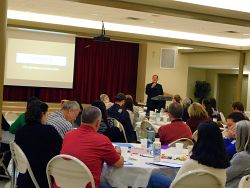Youth and young adults participate in the Salt Lake diocese's inaugural leadership summit

SALT LAKE CITY — Almost 100 youth and young adults from all over the Catholic Diocese of Salt Lake City attended the inaugural Youth and Young Adult Leadership Summit, which took place Oct. 26 at St. Ambrose Catholic Church.
Several priests and seminarians accompanied the youth and young adults to the half-day event, during which dialogue and listening sessions took place.
Bishop Oscar A. Solis and Dr. Patricia Jimenez, communications coordinator of the V Encuentro, were the presenters at the event, which used online interactive systems for immediate feedback when the participants were asked questions.
The event was broken into four sessions interspersed with dialogue, online surveys and questionnaires.
In his session, Bishop Solis talked about the young Church in Utah and the diocesan Pastoral Plan priorities. He emphasized the importance of young people being missionary disciples who should go out to the peripheries despite all the challenges.
“The Pastoral Plan of the diocese helps you with that; it guides us and directs us in all our efforts in seeing to it that our mission of evangelization is carried out in every nook and corner of the diocese here in Utah,” the bishop said.
Only a small percentage of Catholics are priests or men and women religious, “so we rely on the gift of the laity, on the gift of you young people, to help us carry out the work of evangelization in our local Church in the entire state of Utah in the Diocese of Salt Lake City,” Bishop Solis said.
The Pastoral Plan’s five priorities are faith formation, vocations, stewardship, Eucharist and Catholic identity, and the dignity of the human person. The plan outlines goals, objectives and strategies for each of these priorities.
“There is nothing more special that God wants us to do other than to become missionary disciples of Our Lord, always ready and eager to proclaim the Gospel of love and salvation to all the people, especially the people we meet, especially the people we have in our own homes, in our own church communities,” Bishop Solis said.
He encouraged the youth and young adults to not be timid in carrying out their work as leaders.
“You are not by yourselves,” he said. “You have the catechists, you have other parish ministers, you have religious women and men, … you have principals, you have teachers. You have everybody working in one mission – carrying out the mission of Christ.”
After the bishop’s presentation, those attending were broken into groups according to their age. Each group was asked to express their doubts, feelings, successes and convictions. They also were asked to use three words to describe their experience of the Catholic Church. Their responses varied from “home” and “welcoming” to “frustrating” and “catastrophic.”
“It is interesting that one of the big words that comes up is ‘welcome,’ because when the young people don’t feel welcome they become disengaged from the Church,” Jimenez said.
One of the sessions that Jimenez presented was on Christus Vivit, the apostolic exhortation issued by Pope Francis in March 2019, following the 2018 bishops’ synod on young people. The document is addressed “to young people and to the entire people of God.”
The apostolic exhortation “is a summons to young people to step up, to take risks, to test out fears;” it also calls adults to be youthful and for leaders to invest in young people, Jimenez said.
The document calls people to see and observe, judge and interpret, and act and choose, she said. The V Encuentro uses the same methodology, she said, referring to the most recent process by the U.S. Conference of Catholic Bishops on a national level to engage Hispanics/Latinos in the Church.
“Some of you might be thinking, ‘Why do I care about this? I don’t have the Encuentro in my parish, or I am not Latino,’” Jimenez said, but “we are all missionary disciples,” and the V Encuentro sessions prepared young people to be missionary disciples. The process was intended “to reach the engaged and the disengaged; we wanted to reach the different generations, we wanted to reach out in English and in Spanish,” Jimenez said.
The V Encuentro process was carried out on national, regional and local levels; 20 percent of participants were young people.
“One of the goals of the consultation was to equip pastoral leaders at the diocesan, regional and national levels to better understand the Catholic population that they are called to serve,” Jimenez said, pointing out that some of the responses of the local summit were echoing the results of the V Encuentro and the words of Christus Vivit.
“The people asked for accompaniment, for prayer, for community; they want to deepen the understanding of their faith, especially Scripture; they want formation; they are asking for help to understand what a vocation is and how to discern a call from God, ” Jimenez said.
Jimenez said that having the information was important because “we need to uplift young people to serve; we need to listen to them, to pay attention to what they are telling us.”
Participants at the summit were asked to prioritize the strategies of the diocesan pastoral plan. They gave the highest urgency to assessing current practices of ongoing faith formation for post-Confirmation youth and young adults, and promoting Adoration and other worship opportunities for youth.
“This is giving us a great idea of where to start here in your diocese,” Jimenez said.
© Copyright 2025 The Diocese of Salt Lake City. All rights reserved.


Stay Connected With Us